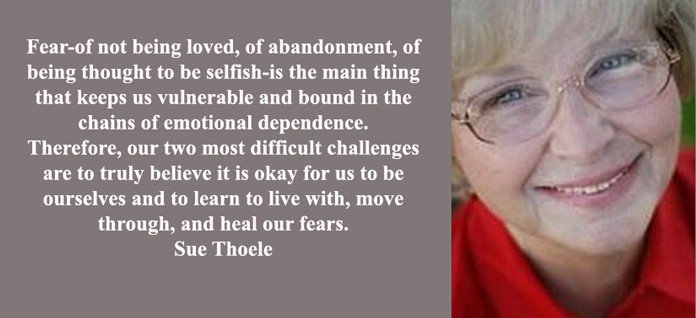What is Fear of Abandonment And Their Common Symptoms

Whatever you most fear – abandonment, rejection, failure, loss, humiliation – has already occurred to you.
Deepak Chopra
What is the fear of abandonment called? The fear of abandonment, also called Autophobia, is a psychological disorder characterized by one’s uncontrollable fear of being left alone. A form of anxiety, it is commonly observed and is usually harmless, but can be threatening on extreme cases.
[toc]
Medicinenet.com defines autophobia as [2]: An abnormal and persistent fear of loneliness, of being alone. A fear of solitude. Sufferers from autophobia may experience anxiety even though they realize that being alone does not threaten their well-being. They may worry about being ignored and unloved, or they may worry about intruders, strange noises or the possibility of developing a medical problem.
The fear of abandonment soon sees the person affected by it imbibing such compulsive behaviours that can lead to devastating characters and attributes that can sabotage relationships and eventually leads to feared abandonment.
Fear & Anxiety are the foundation of low self esteem. Those who suffer from low self-esteem experience extreme fear and anxiety. The person that suffer fear of abandonment is because she/he was wounded in the past, perhaps she/he experienced feeling emotionally abandoned and therefore they feel unworthy and unlovable. These feelings of abandonment create shame and lower she/he self esteem. Not living up to his or her full potentials because he or she feels less than everybody else.
One problem in diagnosing this disorder is that the symptoms tend to be discreet. It is so discreet that most of the time, people are not aware that they are afflicted by it. Anyone can be affected by it. If this fear is interfering with the way you live, you might be suffering from this disorder.
Fear of abandonment and relationships
Fear of abandonment: it is not particular to just a certain people, rather it is synonymous to all humans, how we channel it determines its good or bad effect; it can either break our relationships with people or we can channel such energy into strengthening our relationships with people. The ability to deal with such fear is the first key to determining the ability to convert such energy into becoming our power to heal. Most people for the fear of abandonment become anti-social and unfriendly or become loners so not to be connected to someone enough to not want to lose them, they rather build walls to push others out, while those who already have relationships with people then start to come off too needy, or in constant uncertainty and exude insecurity. But then there are ways other than those that can be exploited to deal with such a situation, they include;
- Accepting it’s a human attribute, do not beat yourself up about it or think yourself weak
- Love yourself enough to know you are worth being with
- Dominate your insecurities rather than project them on others
- Accept it when those insecurities come up and do well enough to suppress it rather than let it rule you
- Do not be too attached to one person, devote yourself to other acts or persons or things that will give you joy enough distract from being too dependent on one source for care and affection, love and attention as well as satisfaction. Make friends with like minds, find a hobby, fuel your passion, chase your dreams. When you meet up with those other things, the fear of being abandoned does not come up.
Among some causes of fear of abandonment we find:
- The most common cause is the death, departure, or abandonment of someone important
- Another cause is a traumatic experience involving being left alone somewhere.
- And the third cause is the memory or stigma arising from an experience while being alone. While these are the most common causes, causes of fear of abandonment are not limited to these three.
Fear-of not being loved, of abandonment, of being thought to be selfish-is the main thing that keeps us vulnerable and bound in the chains of emotional dependence. Therefore, our two most difficult challenges are to truly believe it is okay for us to be ourselves and to learn to live with, move through, and heal our fears. Sue Thoele
7 common symptoms that suffer fear of abandonment
The common symptoms that can be observed from people that suffer fear of abandonment are as follows:
- The person always seeks to reach out to people, especially to those he/she cares about, in an effort to make sure that he/she is not alone.
- The person panics whenever the other party makes a mistake. This mistake is something they associate with someone trying to leave them.
- The person makes an “emotional blackmail” to the other person. He/She would say whatever it takes to make the other person stay with him/her.
- The person would do whatever it takes, even things that they would normally not do to make the other person stay with him/her.
- The person would rather abandon others first rather than risk being abandoned by them. This is a ploy used to avoid emotional attachment or commitment.
- The person is in constant need of reassurance from people that they care about in an effort to assure themselves of their love and care.
- The person always questions his/her self-worth, is unsure of his/her own judgment, and would rather ask for the approval of others.
Research Professor of Psychiatry of University of Arizona College of Medicine Andrew Skodol, MD said :
Borderline personality disorder is characterized by a pervasive pattern of instability in relationships, self-image, moods, and behavior and hypersensitivity to possible rejection and abandonment.
People with borderline personality disorder fear rejection and abandonment, partly because they do not want to be alone.
Fear and anxiety
Fear on his own is a strong tool that affects the mind and determines an action or reaction of a person to situations or things. Anxiety, on the other hand, is seen to be a type of fear mostly associated with threats or a wrong that will be done in the future. The effect of fear and anxiety can pass in a short while or can last a long time and even get one stuck with it. The effect of fear and anxiety can be projected on the ability to concentrate, live in peace, speak up, eat, sleep or even converse with other people as well as carry out acts or responsibilities. It is also known to affect health conditions, throwing an affected person into such a state as a panic attack, an also can affect decision making. It limits people from staying into acts they fear or that makes them anxious, thus do not achieve what they may have wanted to achieve so not to confirm that fear or battle that anxiety. A chronic nature of this can require professional help from a therapist or counselor also where it becomes acute and seen to be personally uncontrollable. However, at its early stage, it can be curbed, and ways to deal with these feelings include;
- Facing such fears especially when it is not a threat to life or an occasion of bodily harm. Most times the fear and anxiety are born out of unfamiliar situations and uncertainties.
- Identify the cause of your fear and/or anxiety and device ways to confront and combat them. Set your goals on how to tackle them and work fervently to see the goals actualized.
- Exercising, some forms of anxiety can be reduced by simple exercises that allow you the body to overturn it when it comes up.
- Rest and relaxation. When the body is too worked up it is more prone to anxiety
- Healthy eating; a good diet and regular food can make for a resistance to anxiety as well
Low self esteem Definition
This is a psychological state of mind that deals with the lowly thought or a condescending opinion of one’s self, such that a person looks down on his/herself or does not believe in his/her ability. It is a negative perception of one’s self to the extent of disbelief and distrust. This is probably from an early stage in life and caused by a few factors that may include bullying, mockery, and any other thing that makes one feel not good enough. It can also be caused by live events or illness that makes one feel inadequate thus taking a dip at a person’s self-esteem. Such low self-esteem hinders a person’s ability to engage in social activities or other acts that he/she could have excelled in had he/she just tried. It kills confidence and makes room for settling for less. Such a person starts to avoid instances or acts that can improve him and rather make do with the mediocre level of living. It can also lead to depression and cause anxiety. Most people pick up unhealthy habits such and alcoholism and smoking to reduce the effect of their situation and a wrong reaction to it may result in such ugly acts as violence. Where such extreme tendencies are prevalent, it is necessary to see a therapist or counselor to help. Affected persons can also take a few steps to alleviate the effect, ways to do so include;
- Be more positive: attack your negative thoughts about yourself and be more positive about yourself and your abilities. Note the reasons you think you can’t and tell yourself the reasons you can.
- Note your abilities: recognize what you are good at, list them out if possible and read them out to yourself as often as possible to encourage yourself of your abilities.
- Surround yourself with positive people: it is necessary to find people of like minds like you who encourage you and strengthen you when you feel down.
- Be assertive: Learn to stand for what you believe in, where there is a talk down on what you are worth, you stand to maintain your stand and assert yourself.
How to overcome fear of abandonment
Overcoming fear of abandonment can be done with a combination of medications, psychotherapy and alternative therapies.
- The patient must be properly diagnosed. After diagnosis, the patient can undergo these forms of treatment. Medications such as tranquilizers and anti-depressant drugs can be prescribed.
- Behavior therapy aims to allow the person to gain control over unwanted behavior by using different techniques.
- Cognitive therapy aims to change unhealthy thought patterns. The patients are also taught how to relax, as stress can trigger anxiety. The patient can also be taught recovery skills, abilities that help them cope with adversity, as the patient ultimately must pursue recovery for and by him/her.
- Counseling and constant communication is important in easing one’s fear of abandonment, so a helping hand is always instrumental for recovery.
- Self Hypnosis will use deep relaxation for building confidence as a person and make the person feel more relaxed around relationships generally. Is like the person can go from desperately needing relationships to merely wanting them as a compliment to their life. Try Fear Of Being Abandoned so that you can start calmer about all your relationships in general.
Quotes about fear of abandonment
One of the greatest lessons of my own life was learning to turn the inner rampage of hatred and anger toward my own father for his reprehensible behavior and abandonment of his family into an inner reaction more closely aligned with God and God-realized love. Wayne Dyer
They say that abandonment is a wound that never heals. I say only that an abandoned child never forgets. Mario Balotelli
I come from a violent background. So I became hard. I realized that I had made myself that way to deal with a feeling of abandonment and shame. Mickey Rourke
I had to get in touch with the source, I had to go back into my abandonment issues with my mother, I had to go into issues with my father I hadn’t even looked at before. Kenny Loggins
One response to feeling abandoned is to abandon yourself. Theodore Millon
[2] https://www.medicinenet.com/script/main/art.asp?articlekey=12196






